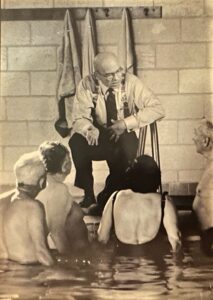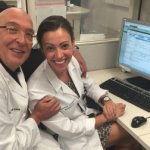“[Our father] definitely wanted his children to go into medicine,” says Jonathan Grayzel, MD, FAAEM, a senior deputy editor with UpToDate based in Concord, Mass. Initially, none of the siblings expressed an interest in medicine, although both he and David ended up getting their medical degrees.
“We could see that [Dad] really enjoyed medicine and was very dedicated to it and found it endlessly fascinating. That’s probably something that caught the fancy of myself and my brother,” Jonathan Grayzel says. “If you had an interest in science and caring for patients, there were a lot of opportunities. That came through clearly with his career and our mom’s career.”
Enjoying the Detective Work
Dr. Arthur Grayzel always had a long-standing interest in the biology of the immune system (his father had been a pathologist at Brooklyn Jewish Hospital in New York), and rheumatology was a field that allowed him to “indulge that interest,” Jonathan Grayzel says.
“I remember once asking him about the things he really enjoyed about rheumatology. It was often the case that when no one could really figure out what was going on with a patient they would consult rheumatology. That sort of complex problem solving was something he really enjoyed,” Jonathan Grayzel says.
Yet teaching fellows and residents also gave him a lot of satisfaction. David Grayzel recalls coming home from school one day at age 11 or 12 as his father was getting ready to work at the Arthritis Foundation, where he mostly worked in Atlanta instead of New York. There were more than a couple dozen fellows in his house to say farewell, and that surprised him.
“I know now as a member of the medical community that the people you train with and the people who trained you have a special place in your heart. It always struck me that rheumatologists are such teachers and care quite a lot about the next generation of folks,” David Grayzel says.
David Grayzel also recalls seeing a picture that embodies the caring nature of his father and his work. In the picture, his father is in a suit, tie and suspenders, sitting at a chair poolside talking with six RA patients who are doing water exercises. “I think you recognize that there’s a chronic nature of rheumatologic conditions that people really struggle with for a lifetime. The acute interventions are, of course, important, but it’s how they live with their disease over time,” he says. This is a balance he says his father was very aware of and eager to help address.




